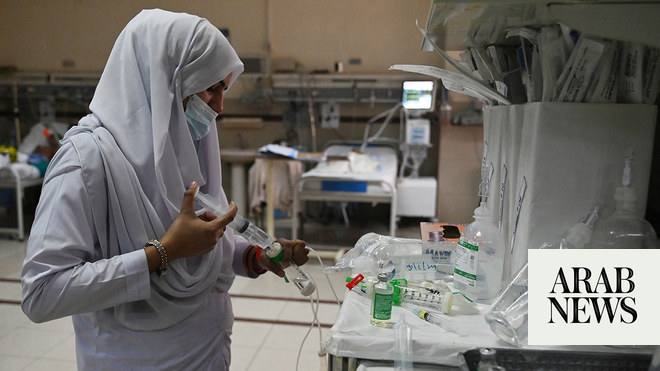KARACHI: Antimicrobial resistance (AMR) is the third leading cause of death in Pakistan, directly or indirectly causing 1 million deaths annually in the South Asian country, officials and public health experts say. said on Sunday.
They spoke at a press conference held in Karachi in connection with the 2024 National Antimicrobial Stewardship Summit organized by Getz Pharma Pharmaceutical Company in collaboration with the Ministry of Health Services, Health Services Academy (HSA) and National Institutes of Health (NIH). I mentioned this in
Experts say around 300,000 people die each year from drug-resistant bacteria, and AMR contributes to 700,000 deaths from complications after treatment for the disease.
These deaths are linked to the “irrational use” of antibiotics, as Pakistan is the third largest consumer of antibiotics in the world after China and India, consuming antibiotics worth Rs 126 billion in 2023 alone. ing.
“Antimicrobial resistance is now the third leading cause of death in Pakistan after cardiovascular diseases, maternal disorders and neonatal disorders. because the disease exists,” said Professor Shahzad Ali Khan. Vice Chancellor, Health Services Academy, Islamabad.
“The overuse of antibiotics by doctors, quacks, and people themselves has made these important medicines far less effective,” he said, adding that people are not using antibiotics without the advice of a trained and qualified doctor. He urged people not to do so.
The summit brought together more than 1,400 medical professionals, including health secretaries and directors from federal and provincial governments, officials from the NIH, Pakistan Drug Regulatory Authority, medical societies and healthcare regulators, and senior physicians and policy makers. was in attendance.
Khan said antibiotics are a “magic bullet” that saved millions of lives during world wars and pandemics, but their “irrational use or abuse” has led to AMR, which is now a global public health crisis. He argued that this is a concern.
“Self-medication, unjust prescribing of antibiotics by quacks and doctors, taking antibiotics for short periods of time, and manufacturing substandard antibiotics by some companies are some of the main causes of antimicrobial resistance. ,” he said.
Professor Javed Akram, former Punjab health minister and president of Pakistan Society of Internal Medicine (PSIM), said AMR is the third biggest challenge facing Pakistan after population growth and non-communicable diseases (NCDs).
“Right now, people are dying from infections that are very difficult to treat because of bacterial resistance to these drugs,” Akram said.
“Pakistan has become the world capital of diabetes and other non-communicable diseases on the one hand, and on the other hand has developed extremely drug-resistant (XDR) typhoid fever, multi-drug-resistant (MDR) tuberculosis and various other infectious diseases. It’s very difficult to treat with most of the antibiotics available, and that’s because we’ve been using them like candy.
He urged people not to take antibiotics alone, saying they have side effects similar to cancer drugs.
Dr. Afrinish Amir, NIH representative and senior microbiologist, said AMR has spread to nearly every country and region, including Pakistan, due to the “misuse and overuse” of antibiotics.
“This contributes to increasing the burden of infections caused by resistant bacteria while limiting treatment options for managing such infections,” she said.
The experts also highlighted the “overuse and overuse” of antibiotics in livestock, saying it was responsible for 80% of AMR in the veterinary sector. They called for increased public awareness about the unreasonable use of antibiotics in humans, livestock and poultry.
Professor Zulfikar Bhutta, a renowned pediatrician and public health scientist, in his keynote address said that Pakistan is the only country in the world where Typhoid Conjugate Vaccine (TCV) is being administered to children. He appealed to people to vaccinate their children against typhoid fever. Prevent drug-resistant waterborne diseases.
Dr Wajiha Javed, deputy director of public health at Getz Pharma, said authorities should investigate the over-the-counter availability of antibiotics, the short-term use of these medicines, and the unnecessary prescribing of antibiotics by quacks and doctors. He said there is. .
She said substandard antibiotics with poor quality or low-grade raw materials were also responsible for AMR, and announced that her company was working with the government to develop a national action plan on AMR.
On this occasion, a declaration on implementation of antimicrobial stewardship (AMS) was also signed between the Academy of Health Services, NIH and Getz Pharma, and a Memorandum of Understanding (MoU) with 13 medical societies in this regard was also signed.

